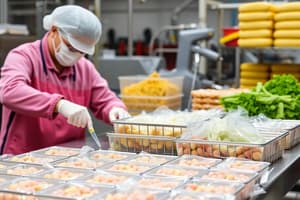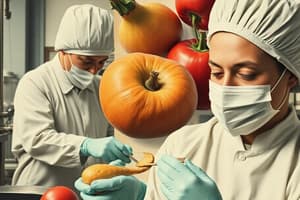Podcast
Questions and Answers
What is a critical factor for ensuring food safety and quality during processing?
What is a critical factor for ensuring food safety and quality during processing?
- Marketing Strategies
- Temperature Control (correct)
- Cost of Ingredients
- Packaging Design
Which measure is NOT typically associated with pest control in food processing facilities?
Which measure is NOT typically associated with pest control in food processing facilities?
- Daily Staff Meetings (correct)
- Pest-proofing Facilities
- Prompt Pest Extermination
- Regular Inspections
What must be regularly documented to demonstrate compliance with GMP standards?
What must be regularly documented to demonstrate compliance with GMP standards?
- Market Research
- Employee Performance Reviews
- Maintenance of Equipment (correct)
- Sales Reports
Which of the following is essential for tracking products in the food manufacturing process?
Which of the following is essential for tracking products in the food manufacturing process?
What is the purpose of regular GMP audits?
What is the purpose of regular GMP audits?
Which aspect is NOT a component of effective sanitation and hygiene protocols?
Which aspect is NOT a component of effective sanitation and hygiene protocols?
What are Good Manufacturing Practices (GMP) primarily focused on?
What are Good Manufacturing Practices (GMP) primarily focused on?
What type of records are critical for systematic review of food manufacturing operations?
What type of records are critical for systematic review of food manufacturing operations?
Why is certification important for food companies implementing GMP?
Why is certification important for food companies implementing GMP?
Why is compliance with GMP crucial for food industries?
Why is compliance with GMP crucial for food industries?
Which principle of GMP involves monitoring personnel for illness?
Which principle of GMP involves monitoring personnel for illness?
What is a significant aspect of the Facilities principle in GMP?
What is a significant aspect of the Facilities principle in GMP?
What must be regularly inspected and properly sanitized to prevent contamination?
What must be regularly inspected and properly sanitized to prevent contamination?
What should raw materials and packaging materials meet in order to be used in food production?
What should raw materials and packaging materials meet in order to be used in food production?
What is essential for maintaining quality and consistency in food manufacturing processes?
What is essential for maintaining quality and consistency in food manufacturing processes?
What should be documented in the food processing stages as per GMP principles?
What should be documented in the food processing stages as per GMP principles?
Flashcards
Good Manufacturing Practices (GMP)
Good Manufacturing Practices (GMP)
A set of guidelines and regulations aimed at producing safe and high-quality food products.
Scope of GMPs
Scope of GMPs
GMPs cover every step involved in food production, from the initial ingredients to packaging and delivery.
Importance of GMP Compliance
Importance of GMP Compliance
Ensuring food safety, maintaining consistent product quality, and building trust with consumers.
GMP Principle: Personnel
GMP Principle: Personnel
Signup and view all the flashcards
GMP Principle: Facilities
GMP Principle: Facilities
Signup and view all the flashcards
GMP Principle: Equipment and Utensils
GMP Principle: Equipment and Utensils
Signup and view all the flashcards
GMP Principle: Materials
GMP Principle: Materials
Signup and view all the flashcards
GMP Principle: Processes
GMP Principle: Processes
Signup and view all the flashcards
Why is temperature control in food processing important?
Why is temperature control in food processing important?
Signup and view all the flashcards
What are GMPs?
What are GMPs?
Signup and view all the flashcards
Why is GMP documentation important?
Why is GMP documentation important?
Signup and view all the flashcards
What are GMP audits?
What are GMP audits?
Signup and view all the flashcards
Why is cleaning and disinfection important in food processing?
Why is cleaning and disinfection important in food processing?
Signup and view all the flashcards
What is pest control in food processing?
What is pest control in food processing?
Signup and view all the flashcards
What is process validation in food processing?
What is process validation in food processing?
Signup and view all the flashcards
What is product identification and traceability in food processing?
What is product identification and traceability in food processing?
Signup and view all the flashcards
Study Notes
Introduction to GMP in Food Industries
- Good Manufacturing Practices (GMP) are guidelines and regulations for safe, quality food production.
- GMPs cover all food production stages, from ingredient sourcing to packaging and distribution.
- GMP compliance is crucial for food safety, product consistency, and consumer confidence.
- Non-compliance can lead to product recalls, legal action, and damaged reputations.
Key GMP Principles in Food Industries
- Personnel:
- Training and hygiene practices prevent food contamination.
- Regular staff training on hygiene, food safety, and GMP standards is essential.
- Cleanliness and appropriate attire are crucial.
- Staff monitoring for illnesses is vital.
- Facilities:
- Suitable facilities and infrastructure are essential for hygienic food manufacturing.
- Proper design, maintenance, and sanitary conditions are vital.
- Features include layout, sanitary design, water supply, waste disposal, and pest control.
- Equipment and Utensils:
- Regular inspection, sanitization, and maintenance prevent contamination and ensure consistent product quality.
- Cleaning and sanitization schedules, procedures, and verification methods are critical.
- Equipment must be suitable for its intended purpose and easy to clean.
- Materials:
- Raw materials, packaging, and other materials must meet safety standards and come from approved sources.
- Incoming materials are checked for potential hazards.
- Raw material storage prevents spoilage and contamination.
- Processes:
- Standard Operating Procedures (SOPs) maintain consistency and quality.
- All stages of food processing are documented.
- This includes production, equipment/material handling, and temperature control.
Specific GMP Considerations for Food Processing
- Temperature Control: Precise temperature control during storage, processing, and packaging is essential for food safety and quality.
- Pest Control: Pest-proofing facilities, regular inspections, and quick pest eradication prevent contamination.
- Sanitation and Hygiene: Proper sanitation routines and hygiene protocols are crucial throughout all areas.
- Waste Management: Safe waste handling prevents contamination of food or the environment.
- Cleaning and Disinfection: Regular, thorough cleaning and disinfection of surfaces, equipment, and utensils minimize contamination and prevent microbial growth.
- Product Identification and Traceability: Systems are needed to track products, batches, and production dates.
- Process Validation: Measures are needed to verify each process stage meets food safety and quality standards, including using equipment as designed and maintaining temperature log books.
GMP Documentation
- Comprehensive documentation is crucial for GMP compliance and process control.
- Records of personnel training, equipment maintenance, and cleaning procedures are required.
- Accurate records of all food manufacturing process activities allow for operation reviews. Examples include:
- SOPs
- Calibration Logs
- Cleaning and Sanitization Records
- Temperature Logs
- Raw Material Records
- Production Records
- Pest Control Logs
- Documentation should be easily accessible and well-organized to ensure compliance with audits.
GMP Audits and Certification
- Regulatory bodies and third parties audit GMP compliance.
- Regular audits ensure continuous improvement and GMP compliance.
- Certification demonstrates quality and safety, building consumer trust and confidence.
Conclusion
- GMP is essential for producing safe, high-quality food products.
- Implementing and maintaining robust GMP programs mitigates risks and strengthens reputations.
- Adherence to GMP guidelines is crucial for achieving and maintaining food safety and consumer trust.
Studying That Suits You
Use AI to generate personalized quizzes and flashcards to suit your learning preferences.




